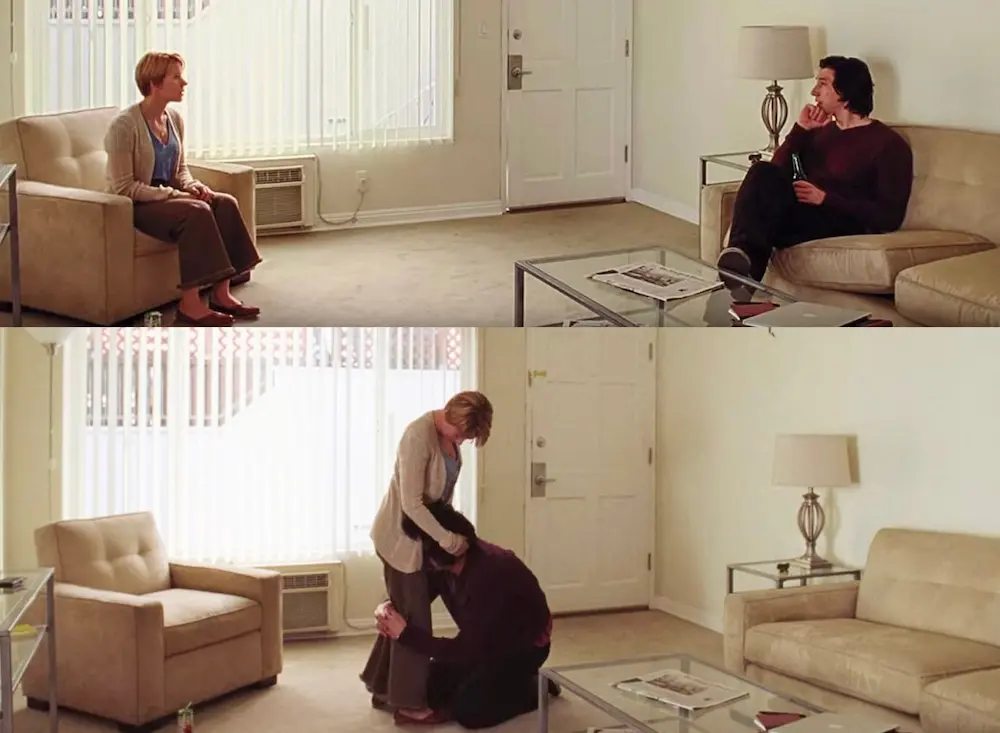This is a translated version of Ko's second essay of a series "How Can I Stop Being Angry?"

"I think about being married to you, and that woman is a stranger to me."
"I can't believe I have to know you forever!"
"Everyday I wake up and I hope you're dead ... Get hit by a car and die!"
Don't worry. These are not my words to Kang; they are lines from the movie "Marriage Story." It's one of my favorite films, and this scene is my absolute favorite within it. The protagonists, Charlie and Nicole, are in the midst of a custody battle during their divorce proceedings. Exhausted by the slander about each other conveyed by their lawyers, Nicole visits Charlie's house to communicate directly with him, but things don't go as expected. They both want to resolve things peacefully without escalating the lawsuit further. However, as the conversation progresses, anger starts to surface bit by bit. The conversation turns into a competition of 'who can hurt another more.' The exploding emotions were so agonizing that even I, as a viewer, felt suffocated by the intensity.
Of course, I don't particularly favor this scene for some perverted reason like taking pleasure in cruel emotional fights. Charlie, collapsing on the floor in tears, embraces Nicole's legs and says, "I'm sorry." Nicole strokes Charlie's back and replies, "I'm sorry too." At the start of their conversation, they sit far apart in a small room, but by the end of their fight, they are huddled together in the middle of the room. The narrowed distance between them. The feeling of loving and hating someone so much. I hoped they wouldn't part ways. I understood why this movie was titled "Marriage Story" instead of "Divorce Story."
"When the door of communication is open, there is nothing we cannot do. Therefore, we must always strive to keep that door open." - Thich Nhat Hanh, "Anger"
Leaning onto each other and sharing the pain in their hearts, what the two needed wasn't a long heated fight but a brief moment of understanding. I wondered, is there any way to take the step of reconciliation before getting angry? If only that were possible, there would be no need to say terrible things to the person you love. There wouldn't even be anger in our heart or broken relationships in the first place. Why do we have to let out intense anger to barely understand each other?
When I don't know how to express anger properly, I end up getting angrier than necessary. Saying things like "What's wrong? Just say it!" only escalates anger, and friends who have no idea why I'm angry often lead to more frustration. The more precious the other person is, the faster that anger amplifies. "How can someone who claims to love me not understand how I feel?" One person's anger soon becomes two people's, and that anger evolves into a fight.
I can't just choose to talk to people whose styles match well with mine. In family relationships, I have to put in even more effort to align my attitudes toward anger. But no one has taught me how to express anger well to someone I love. I could only guess. Saying this hurts the other person more. That person reacts this way when angry. The fight didn't escalate when I walked away. Making mistakes, going through trial and error, figuring it out intuitively. This has been my way of learning anger management.
When issues arise at work, we hold meetings to resolve them. But even though I believe dealing with emotions like anger is an important issue, I couldn't bring myself to put this problem on the discussion table. As a result, I had to go through costly failures. Sometimes my words about the other person's feelings fueled their anger. I would also get upset when no one appreciated my efforts to hold back the anger. As I went through this trial and error, my heart was slowly falliing apart.
If I can't learn by direct experience or adept noonchi, there was only one option left: asking directly. Of course, I can't discuss strategies for peace while seething with anger. Just as a healthy person can imagine death more objectively than a sick person can, I thought now, when things are good between me and Kang, is the best timing to talk about anger. I worried that bringing up past fights might ruin a good day or make it seem like dredging up old conflicts unnecessarily. But I knew safeguarding the loved one from anger was more important than my pride.
Fighting is not something you do alone. So figuring out how to express and deal with anger is not something to be done alone either. "What can I do to help when you're angry?" "I need time alone when I'm angry." "I was always grateful for how you tried to understand my feelings even when I was angry." Before anger claws at us once again, I wanted to convey my feelings directly to Kang. After much thought, I decided to write Kang a "Letter of Reconciliation". Hoping my efforts would reverse the order of fighting and reconciling.
Express the will to seek peace with others. Ask for help. - Thich Nhat Hanh, "Anger"